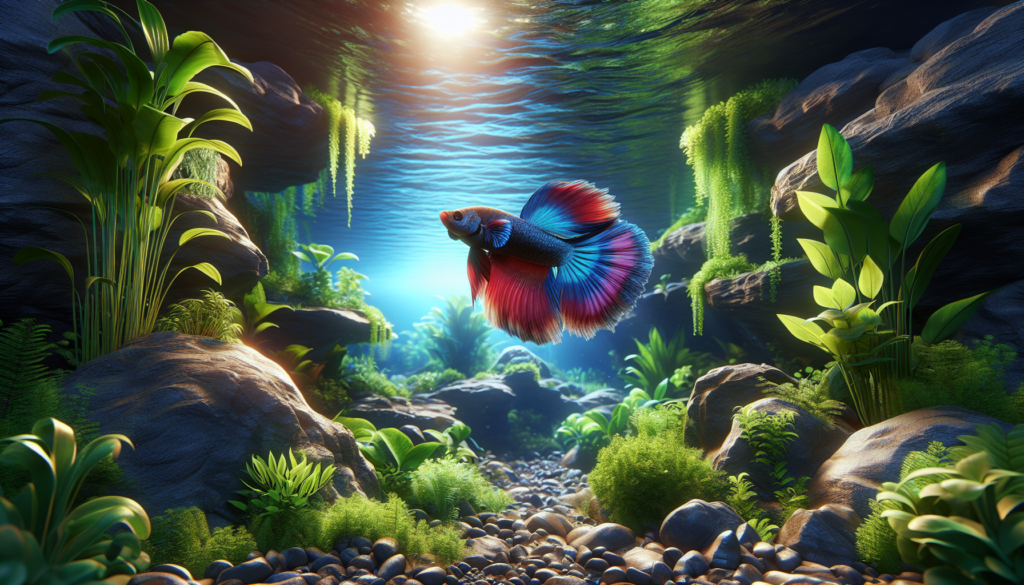Have you ever wondered how long a betta fish can live? Well, you’re in the right place! In this article, we will explore the average lifespan of a betta fish and discuss some factors that can influence their longevity. Whether you’re a seasoned betta fish owner or considering getting one as a pet, understanding their lifespan is crucial for providing them with the best care possible. So, let’s dive into the fascinating world of betta fish longevity!

Factors Affecting Betta Fish Lifespan
Betta fish are known for their vibrant colors and flowing fins, making them a popular choice for pet fish enthusiasts. However, in order to ensure that your betta fish lives a long and healthy life, there are several factors that you need to consider. These factors include genetics, water quality, nutrition, tank size, and tank decorations. By understanding and actively managing these factors, you can greatly increase the lifespan of your betta fish.
1.1 Genetics
Genetics play a significant role in determining the lifespan of a betta fish. Some betta fish are bred to have stronger genetic traits that make them more resilient and less prone to diseases and illnesses. If you want your betta fish to live a long life, it is important to choose a fish that comes from a reputable breeder or pet store. By selecting a betta fish with strong genetics, you are giving your fish a head start in terms of lifespan.
1.2 Water Quality
Water quality is a crucial factor in the overall health and lifespan of a betta fish. Betta fish are native to the warm, shallow waters of Southeast Asia, and they are accustomed to living in clean and well-oxygenated environments. In order to promote optimal water quality, it is essential to regularly test the water parameters such as pH, ammonia, nitrite, and nitrate levels. Additionally, regular water changes and the use of a good filtration system will help to maintain a healthy and stable environment for your betta fish.
1.3 Nutrition
Proper nutrition is vital for the overall well-being of a betta fish. Betta fish are carnivorous, which means they require a diet consisting of high-quality protein sources. It is recommended to feed your betta fish a balanced diet of betta-specific pellets or flakes, supplemented with occasional treats such as freeze-dried bloodworms or brine shrimp. Overfeeding or feeding the wrong type of food can lead to obesity and various health issues, which can ultimately shorten the lifespan of your betta fish.
1.4 Tank Size
The size of the tank plays a significant role in the lifespan of a betta fish. While betta fish are often kept in small bowls or containers, this is not an ideal living environment for them. Betta fish require a tank that is at least 5 gallons in size, as this provides them with enough space to swim and explore. In a larger tank, betta fish have the opportunity to exercise and exhibit natural behaviors, leading to a healthier and longer life.
1.5 Tank Decorations
Tank decorations not only enhance the aesthetics of the aquarium, but they also play a role in the well-being of a betta fish. Betta fish are known to appreciate places to hide and explore, such as caves, plants, and other tank decorations. Providing a variety of hiding spots and stimulating environments can help reduce stress and promote a sense of security for your betta fish. It is important to choose tank decorations that are safe for your fish, avoiding sharp edges or small openings that can cause injury.
2. Average Lifespan of a Betta Fish
The average lifespan of a betta fish can vary depending on whether they are living in the wild or in captivity.
2.1 In the Wild
In the wild, betta fish typically have a shorter lifespan compared to those kept in captivity. They face various natural predators, harsh environmental conditions, and limited availability of food. On average, betta fish in the wild have a lifespan of 2 to 3 years. However, some lucky individuals may live up to 5 years in the wild if they are able to find optimal conditions and avoid predation.
2.2 In Captivity
When kept in captivity under ideal conditions, betta fish can live significantly longer than their wild counterparts. With proper care and attention to the factors mentioned earlier, betta fish in captivity can live an average of 3 to 5 years. However, it is not uncommon for well-cared-for betta fish to live beyond the age of 5, with some reaching 7 or even 8 years of age. By ensuring a suitable environment, providing a balanced diet, and regular monitoring of their health, you can greatly extend the lifespan of your beloved betta fish.
In conclusion, there are several factors that can affect the lifespan of a betta fish, including genetics, water quality, nutrition, tank size, and tank decorations. By taking these factors into consideration and providing your betta fish with the optimal living conditions, you can enhance their overall health and significantly increase their lifespan. Remember, a happy and healthy betta fish will bring you joy and companionship for many years to come.

